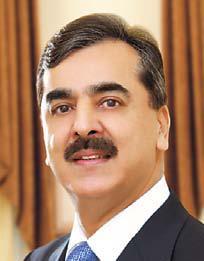The following is a message from Pakistan Prime Minister Syed Yusuf Raza Gilani on the occasion of Pakistan Day, March 23, 2012. ― Ed.
March 23 is a landmark day in the history of Pakistan when the Muslims of the Indian sub-continent adopted the historic Lahore Resolution put forth by A.K. Fazal-e-Haq on March 23, 1940 at the famous Minto Park (now Minar-e-Pakistan. This resolution at the 27th annual meeting of the All-India Muslim League provided the Muslims with an ideal, and united them in the pursuit of a shared objective. It was an epoch-making event which changed the course of history for Indian Muslims. The resolution demanded the establishment of a separate state based on the higher ideals of Islamic social justice and human compassion. In his concluding remarks, Quaid-e-Azam Muhammad Ali Jinnah described the event as a milestone in the history of Hindustan. He said that the more the Muslims organized themselves, the closer they would get to their destination.
Though poet-philosopher Allama Dr Muhammad Iqbal provided the idea for the establishment of a separate homeland in his famous Allahabad address in 1930, there was still a need for a visionary leader to translate this concept into reality. The Quaid-e-Azam, Muhammad Ali Jinnah, endowed with the qualities of statesmanship, rose to the occasion to steer the ship of the Muslims from the tempest it was stuck in. Renowned American historian Stanley Walpert has paid a glowing and befitting tribute to his leadership with the following words: “Few individuals significantly alter the course of history. Fewer still modify the map of the world. Hardly anyone can be credited with creating a nation-state. Muhammad Ali Jinnah did all three.”
The Quaid-e-Azam said to his secretary Matloob-ul-Hassan after the approval of the Lahore Resolution that “Iqbal is not present amongst us today. Had he been alive, he would have been happy to know that we fulfilled his desire.”
The British imperialists and the Hindu leadership were both opposed to the establishment of a separate state and wanted to keep the sub-continent united at all costs. The Quaid-e-Azam remained steadfast in his demand that no solution to the Indian political and constitutional problem except the creation of a new sate would be acceptable to the Muslims. He believed that in a united India, the Muslims would be relegated to the status of second-class citizens. So he waged a determined struggle to carve out a state where the Muslims could live their individual and collective lives in accordance with their traditions. While delivering a speech in Peshwar on Nov. 24, 1945, the Quaid-e-Azam said: “Our religion, our culture, and Islamic ideals are our driving force to achieve independence. “Pakistan not only means freedom and independence but the Muslim ideology which has to be preserved.” He was of the view that the European model of democracy was not applicable to united India as it would provide the majority with an opportunity to establish its government and the minorities would become subjugated.
The Lahore Resolution, which was later on very rightly described as the Pakistan Resolution, changed the destiny of the Indian Muslims. It provided the impetus to their struggle and ignited their passion to realize the dream of a separate state. This explains why Pakistan came into being as the largest Islamic state on the map within a short span of seven years in 1947. Today, Pakistan as a flourishing democracy enjoys an honorable place in the comity of nations.
The present democratic government is committed to preserving our great cultural heritage and distinct political and civilization identity in the light of the vision of Quaid-e-Azam Muhammad Ali Jinnah, Shaheed Zulifkar Ali Bhutto and Shaheed Mohtaram Benazir Bhutto. We are making our earnest efforts to bring about the economic and social revolution in keeping with the spirit of the Pakistan Resolution. The government revived the Constitution of 1973 in its original form by deleting the dictatorial insertions from it. We undertook broad-based reforms in political, legislative and administrative domains which include the 18th, 19th and 20th Constitutional Amendments, empowerment of women, the seventh NFC Award, self-governance to Gilgit-Baltistan, deletion of Concurrent List, devolution of power to federating units and revival of Council of Common Interest etc.
In an effort to address the long-standing grievances of the Baloch people and end their sense of deprivation, the democratic government introduced Aagaz-e-Haqooq-e-Balochistan Initiative to mainstream the role of the Baloch in national development. The government has just completed its fourth year in office and the success of the coalition owes itself to the policy of reconciliation and consensus espoused by Shaheed Mohtrama Benazir Bhutto. Though we did encounter a few problems on the way, we did not allow these hurdles to hamper our march toward progress and development, for which the entire nation deserves to be congratulated.
March 23 is not only a day of celebration but also an opportunity to reiterate our pledge to keep working hard for the attainment of the objectives contained in the Pakistan Resolution. On this auspicious occasion, we pledge to uphold the supremacy of democracy and rule of law at all cost. We need to strengthen the principles of mutual tolerance, brotherhood and reconciliation to foster unity in our ranks. We have to strengthen our national security and independence in accordance with our national aspirations. The day demands us to revive the spirit of the Pakistan Movement in its entirety.
I pray to Allah Almighty to enable us to protect Pakistan and put it on the rails of progress and prosperity.
 |
Syed Yusuf Raza Gilani |
By Syed Yusuf Raza Gilani, Prime Minister of Pakistan








